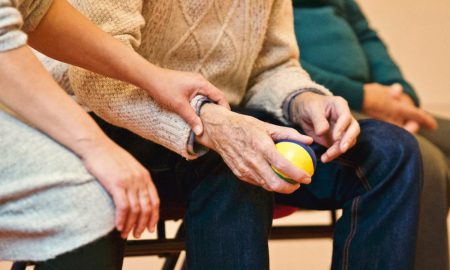
Depression Is More Than Just Sadness! Here’s Are Four Common Misconceptions About Depression

 Mental health and depression are more common than we would like to believe. However, in most parts of the world, it is still a taboo topic. The fact that people talk about it in hushes only adds to the woes of those battling mental health issues. Add to it, the numerous myths that are so popular that people choose to believe them over facts. It makes life difficult and pushes those battling depressions into corners.
Mental health and depression are more common than we would like to believe. However, in most parts of the world, it is still a taboo topic. The fact that people talk about it in hushes only adds to the woes of those battling mental health issues. Add to it, the numerous myths that are so popular that people choose to believe them over facts. It makes life difficult and pushes those battling depressions into corners.
If you wonder if this is an issue as serious as we claim it to be, here are a few numbers. According to research data from 2017, around 17.3 million U.S. adults battle depression. This means around 7.1% of all the adults in the country are battling depression. And they all have had at least one episode in the last year.
And of these people, only 65% received combined care from both a healthcare professional and medication. And 35% of the adults chose not to treat their mental health issues or depression. The pandemic wrecking havoc and an increase in the number of people reporting mental health issues, one can be sure that these stats have only risen to an all-new alarming level. The only way we could help those battling mental health issues and help reduce the episodes is by being supportive of their struggle. But, for that, you should understand what depression is by debunking the common misconceptions. Here’s a look at the four common misconceptions about depression and what it is like!
Myth 1: Traumatic Events Are the Only Cause of Depression
 While it might seem like a valid assumption, depression is more than just a result of personal trauma. A traumatic event only intensifies the struggle of a person battling depression and takes longer for them to cope than any other individual.
While it might seem like a valid assumption, depression is more than just a result of personal trauma. A traumatic event only intensifies the struggle of a person battling depression and takes longer for them to cope than any other individual.
Myth 2: Depression Is All in the Person’s Head
One of the most common and condescending statements that depressed people tend to hear is that it is all in their heads. This is not just far from true. It is also a hurtful statement that only further pushes them into their shell. So, if you are battling depression, remember that it is not just in your head, and you’re not doing it for attention. Your struggle is real, and it is perfectly fine to feel the way you are while battling depression. And it is alright to take the time to recover.
If you know someone who has a tough time battling depression, be supportive and give their struggle the same support you would if someone were to deal with a physical illness. Just the way you wouldn’t ask a physically sick person to stop being sick or go out and socialize to start feeling better doesn’t do that to a depressed person.
Myth 3: Depression Is Just Sadness!
 Sorrow or sadness is something we all experience from time to time. Most of us remember crying ourselves to sleep at least once in this lifetime. However, depression is more than just that. While a person could be sad for a few hours or days, depression episodes are long-lasting.
Sorrow or sadness is something we all experience from time to time. Most of us remember crying ourselves to sleep at least once in this lifetime. However, depression is more than just that. While a person could be sad for a few hours or days, depression episodes are long-lasting.
In short, people with depression don’t start feeling alright on their own. They would need the assistance of a professional and their loved ones to start coping with their struggles. Besides that, depression is not just sadness.
It involves a person battling more severe emotions than just sadness. A depressed person has to deal with other intense struggles like anxiety, a sense of void, nervousness, self-doubt, and numerous other negative emotions. When we characterize depression as just another form of sadness, we minimize the struggles of those battling depression and do more harm than good to our loved ones who need our help.
Myth 4: Medication Is the Only Way to Treat Depression
According to a recent study, only 6% of the adults battling depression and sought professional help were on medication to treat their condition. While mental health and depression are real struggles, popping pills isn’t the only solution to treating it. Research evidence suggests that Cognitive Behavioral Therapy or CBT is effective in treating depression too. So, don’t just pop in those pills or advise people to go on medication to aid them in their battle. Remember, every person’s depression is different, and so is the approach to treating it.
Remember that depression is not a sign of weakness or an attempt at seeking attention. It is perfectly fine to seek help if you’re having a tough time dealing with your emotions and life. If you believe that someone you know might be struggling with depression, make it a point to reach out to them, rather than waiting for them to come to you. Most people battling depression might not ask for help!
More in Mental Health
-
`
Is Swimming in Cold Water Good for You?
Swimming is a beloved activity that provides numerous physical and mental health benefits. Swimming can be a fantastic workout, whether you’re...
November 15, 2023 -
`
Unlocking the True Benefits of Detox Water
Detox water has taken the health and wellness world by storm, promising a wide range of benefits that go beyond ordinary...
November 7, 2023 -
`
How Tom Brady Shed 10 lbs After Retirement
One of the NFL’s most celebrated athletes, Tom Brady, has always been a topic of discussion. Brady never fails to surprise,...
November 1, 2023 -
`
AI’s Hidden Toll on Our Brains
Artificial Intelligence (AI) has permeated almost every facet of our lives, from virtual assistants and recommendation algorithms to autonomous vehicles and...
October 24, 2023 -
`
What to Drink During a Workout
When it comes to getting the most out of your workout, proper hydration is key. What you drink during exercise can...
October 17, 2023 -
`
Wearable Technology Applications in Healthcare
The world of healthcare is evolving at an unprecedented pace, and wearable technology is one of the driving forces behind this...
October 10, 2023 -
`
Initiating and Integrating Exercise in Daily Life
Incorporating exercise into our daily lives is essential for maintaining optimal health and well-being. However, initiating a fitness routine and seamlessly...
October 10, 2023 -
`
Jason Momoa’s Workout Routine for Iconic Aquaman Look
We all remember the moment: The big screen lights up, waves crash, and out emerges Jason Momoa as Aquaman, with his...
October 8, 2023 -
`
Crying: The Benefits on Mental Health
In a world that often champions stoicism and emotional restraint, shedding tears is sometimes dismissed as a sign of vulnerability. However,...
September 26, 2023















You must be logged in to post a comment Login